Georges Feydeau Plays: TwoThe Girl From Maxims, Shes All Yours, Jailbird Feydeau was the most successful French dramatist of the
belle poque and is now widely regarded as one of the greatest of farce-writers and a worthy successor to Molire and Labiche. His series of dazzling hits matched high-speed action and dialogue with ingenious plotting. Reaching the heights of farcical lunacy, his plays nevertheless contain touches of barbed social comment and allowed him to mention subjects which would have provoked outrage in the hands of more serious dramatists. This volume of new, sparkling translations by Kenneth McLeish contains two plays from the peak of his career,
The Girl from Maxims, perhaps his best known, and
Shes All Yours (La Main passe), together with an early work,
Jailbird (Gibier de potence).
Georges Feydeau was born in Paris in 1862, the son of the novelist Ernest Feydeau. His first one-act play,
Love and Piano, was performed when he was 18 and he had his first success with
Tailleur pour dames in 1887, when he also married an heiress.
Among his many plays his best known are perhaps Le Systme Ribadier (1892), Monsieur chasse! (1892), Un Fil la patte (1894), LHtel du libre change (1894), Le Dindon (1896), La Dame de chez Maxim (1899), La Puce loreille (1907), Occupe-toi dAmlie (1908), and On purge bb (1910). He contracted syphilis and was committed to an asylum in 1919 and died in 1921. by the same author FEYDEAU PLAYS: ONE (Hearts Desire Hotel, Sauce for the Goose, The One That Got Away, Now You See It, Pig in a Poke)  Contents
Contents
| 1862 | Born in Paris, December 8 |
| 1874 | Death of father, Ernest |
| 18719 | Attended boarding schools |
| 1879 | Joined a law firm as clerk |
| 1880 | Began to write and recite monologues |
| 1881 | Par la fentre (Through the Window), first play to be professionally performed, produced by Rosendal |
| 1883 | Amour et piano (Love and Piano), Thtre de lAthne Took post as secretary to Thtre de la Renaissance |
| 18834 | Military service |
| 1884 | Gibier de potence (Jailbird), produced by Le Cercle Volney |
| 1887 | Tailleur pour dames (Tailor to the Ladies), Thtre de la Renaissance his first hit |
| La Lycenne (The Schoolgirl), Thtre des Nouveauts |
| 1888 | Un Bain de mnage (A Household Bath), Thtre de la Renaissance |
| Chat en poche (Pig in a Poke), Thtre Djazet |
| Les Fiancs de Loches (The Fiancs of Loches), Thtre Cluny |
| 1889 | Married Marianne Duran |
| LAffaire Edouard (The Edward Affair), Thtre des Varits |
| 1890 | Le Manage de Barillon (Barillons Marriage), Thtre de la Renaissance |
| 1892 | Monsieur chasse! (The One That Got Away), Thtre du Palais-Royal |
| Champignol malgr lui (Champignonl in Spite of Himself), Thtre des Nouveauts |
| Le Systme Ribadier (Now You See It), Thtre du Palais-Royal |
| 1894 | Un Fil la patte (On a String), Thtre du Palais-Royal Le Ruban (The Ribbon), Thtre de lOdon |
| LHtel du libre change (Hearts Desire Hotel), Thtre des Nouveauts |
| 1896 | Le Dindon (Sauce for the Goose), Thtre du Palais-Royal |
| LesPavs de lours (A Little Bit To Fall Back On), Thtre Montpensier, Versailles |
| 1897 | Sance de nuit (Night Session), Thtre du Palais-Royal Dormez, je le veux! (Sleep, I insist!), Thtre de lEldorado |
| 1899 | La Dame de chez Maxim (The Girl From Maxims), Thtre des Nouveauts |
| 1902 | La Duchesse des Folies-Bergres (The Duchess From the Folies-Bergres), Thtre des Nouveauts |
| 1904 | La Main passe (Shes All Yours), Thtre des Nouveauts |
| 1905 | LAge dor (The Golden Age), Thtre des Varits |
| 1906 | Le Bourgeon (The Bud), Thtre du Vaudeville |
| 1907 | La Puce loreille (A Flea In Her Ear), Thtre des Nouveauts |
| 1908 | Occupe-toi dAmlie (Look after Lulu), Thtre des Nouveauts |
| Feu la mre de Madame (Madames Late Mother), Thtre de la Comdie Royale |
| 1909 | Moved into the Htel Terminus, where he lived until 1919 |
| Le Circuit (The Circuit), Thtre des Varits |
| 1910 | On purge bb (Purging Baby), Thtre des Nouveauts |
| 1911 | Cent millions qui tombent (A Hundred Million Falling), Thtre des Nouveauts |
| Mais nte promne donc pas toute nue! (Dont Walk Around Naked!), Thtre Fmina |
| Lonie est en avance (Lonie Is Early), Thtre de la Comdie Royale |
| 1913 | On va faire la cocotte (Were going to play cocotte), Thtre Michel |
| 1914 | Divorced |
| Je ne trompe pas mon mari (Im Not Deceiving My Husband), Thtre de lAthne |
| 1916 | Suffered increasing bad health caused by syphilis Hortense a dit: Je men fous! (Hortense said: I dont care!), |
| Thtre du Palais-Royal |
| 1919 | Committed to a sanatorium by his family |
| 1921 | Died June 5 |
Feydeaus father, Ernest Feydeau, was a stockbroker and novelist, a friend of Baudelaire, Flaubert and the Goncourt brothers who mocked him in their
Journals for an interest in ancient Egypt so passionate that it was a form of adultery with him. He died when his son was eleven, and his wife and her second husband (the drama critic Henri Gouquier) sent the boy to boarding school. At about this time young Feydeau first became fascinated by theatre, and like his near contemporary Alfred Jarry wrote skits and sketches to amuse his school friends. From 1883 Feydeau worked as secretary to the Renaissance Theatre, and his first full-length play,
Tailleur pour dames (1887), had a successful run there when he was twenty-five.
At about the same time he met and married an heiress, and in 1892 he had a hit with Monsieur chasse! at the Palais-Royal, the theatre which had previously seen Labiches greatest triumphs. In the same year, Champignol malgr lui opened at the Nouveauts, and it and Tailleur pour dames each ran for more than 1000 performances. Feydeau went on to write more than two dozen plays, ranging from one-act sketches to historical spectaculars, and including the grands vaudevilles for which he is best known outside France: these range from Un Fil la patte in 1894 to his mature masterpieces LHtel du libre change, Le Dindon, La Dame de chez Maxim and La Puce loreille. Feydeaus public success was offset by private misery. He spent each afternoon writing or directing, each evening at the show and then at Maxims (where he had a table permanently reserved); he returned home at three or four in the morning, and began again at noon the next day. His wife shared none of his interests, and eventually asked him to leave.

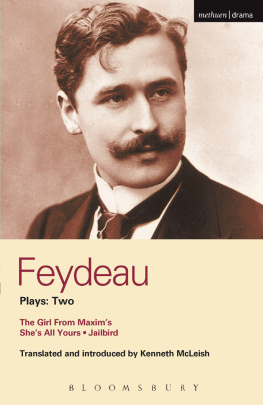
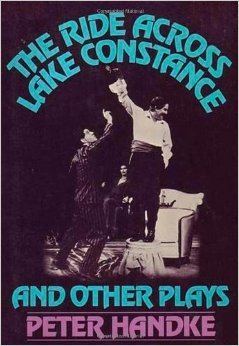

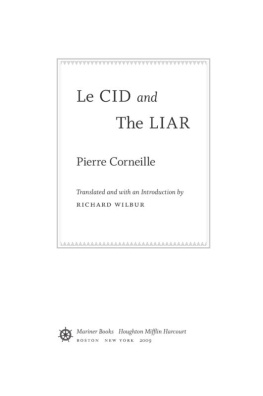




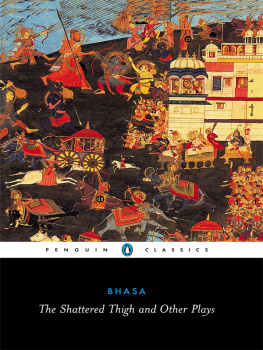
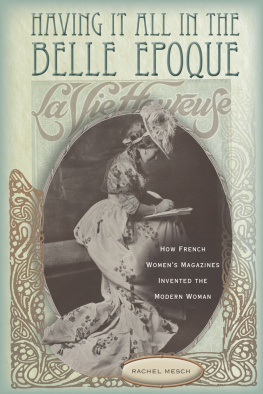
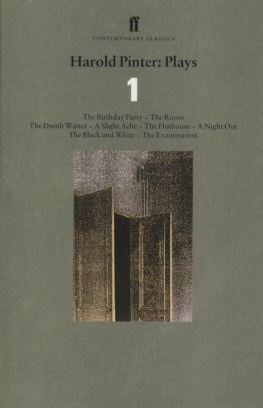

 Contents
Contents